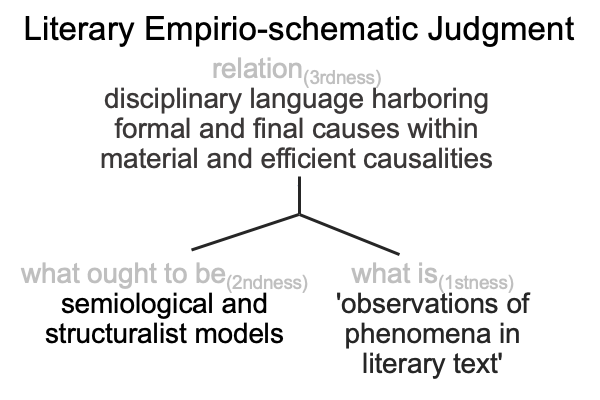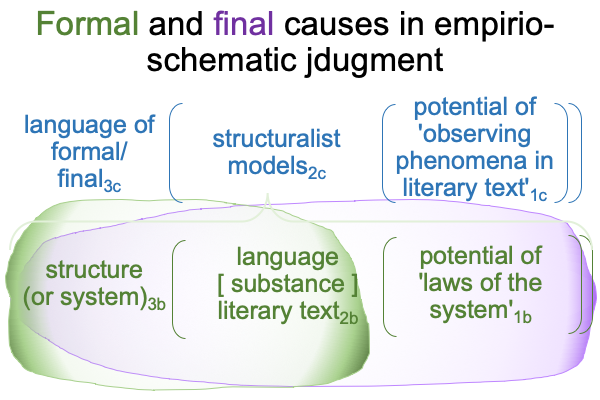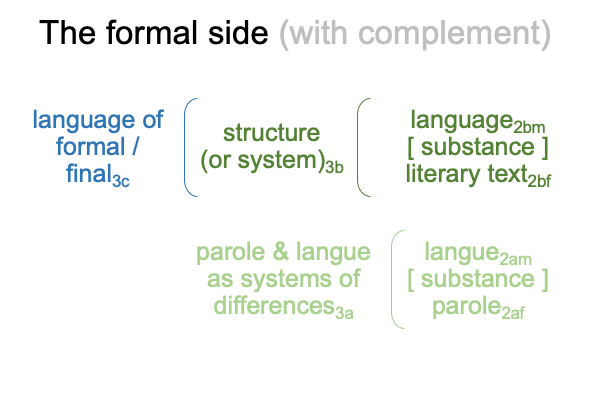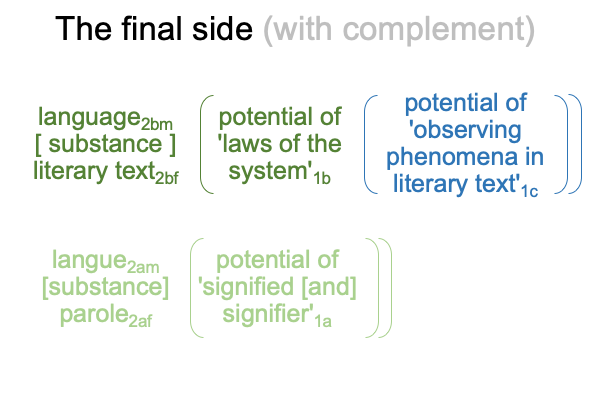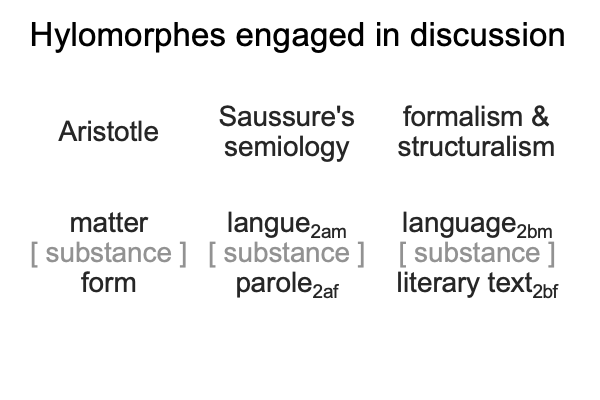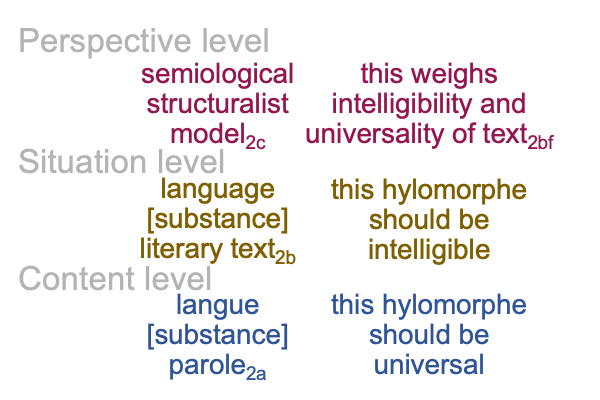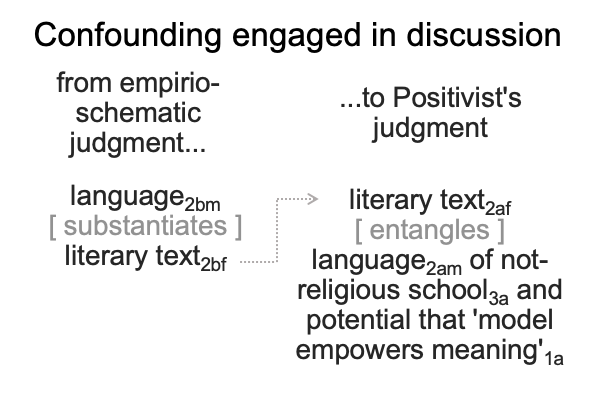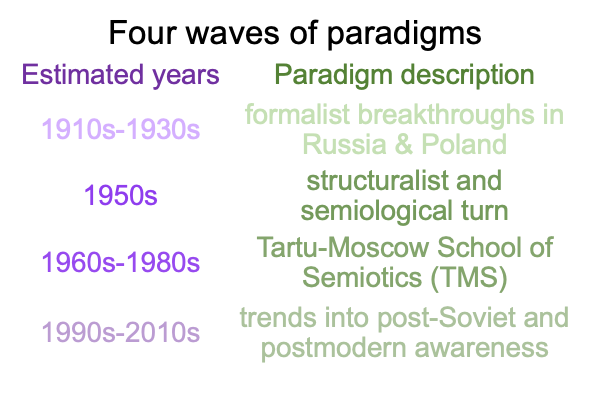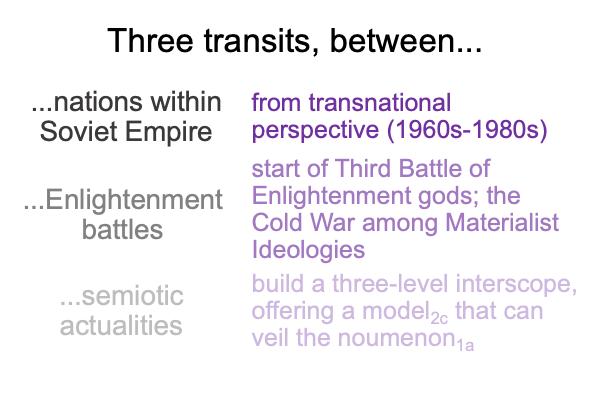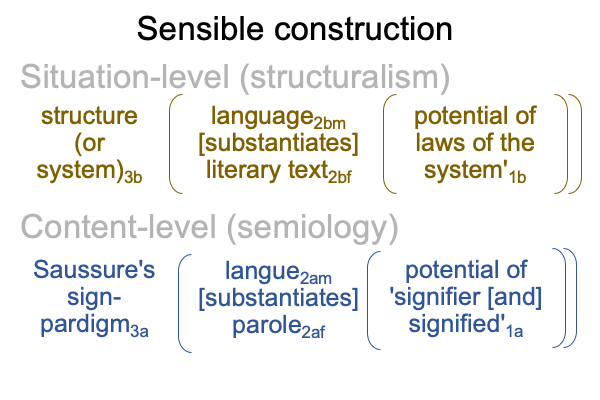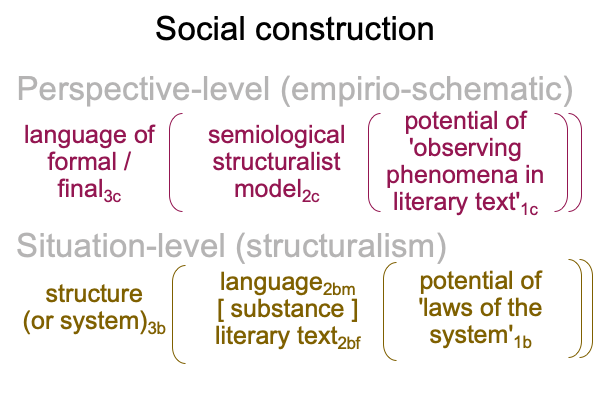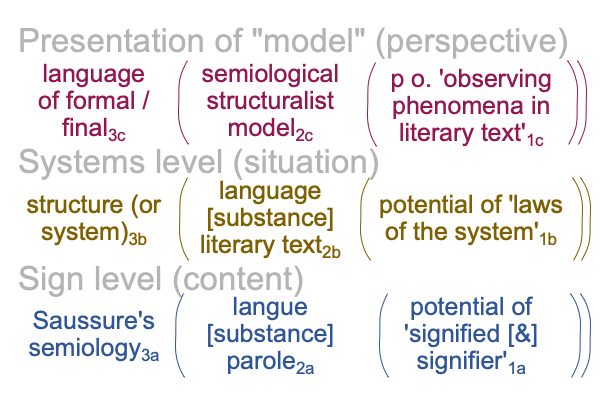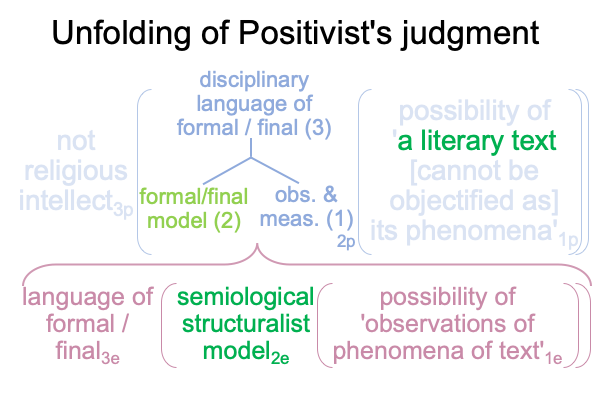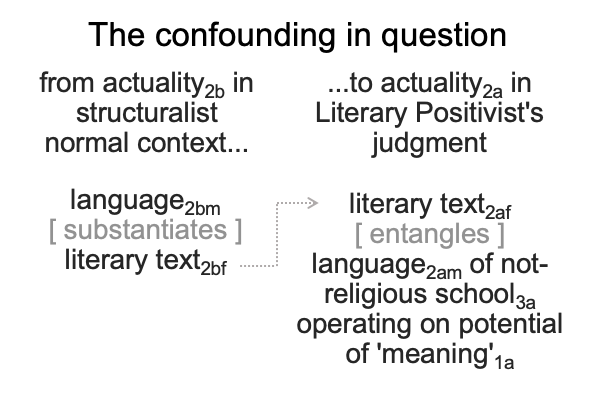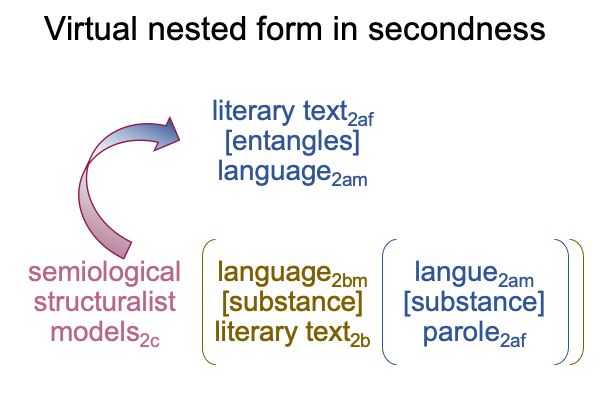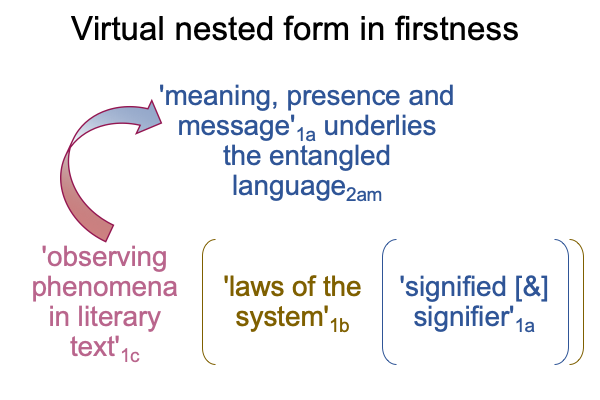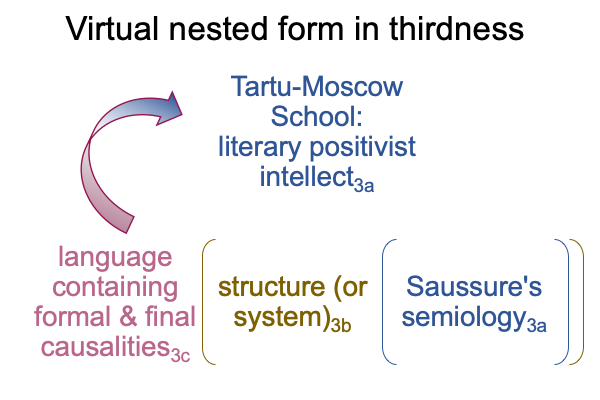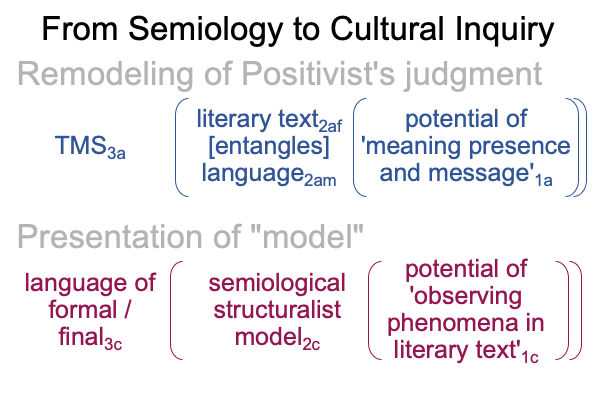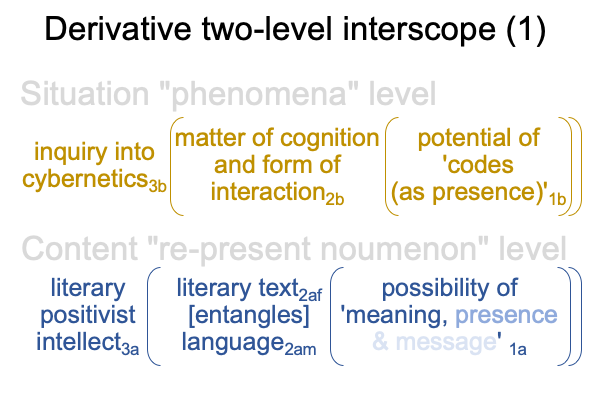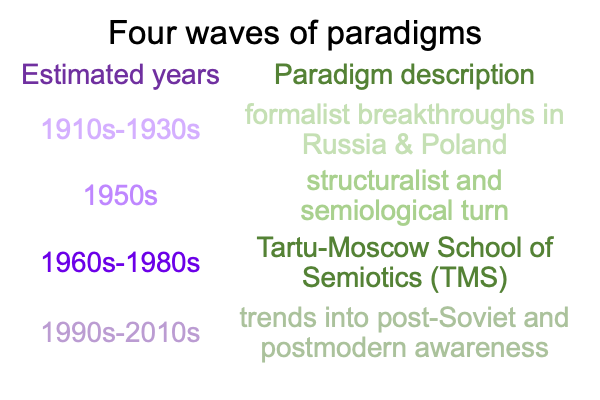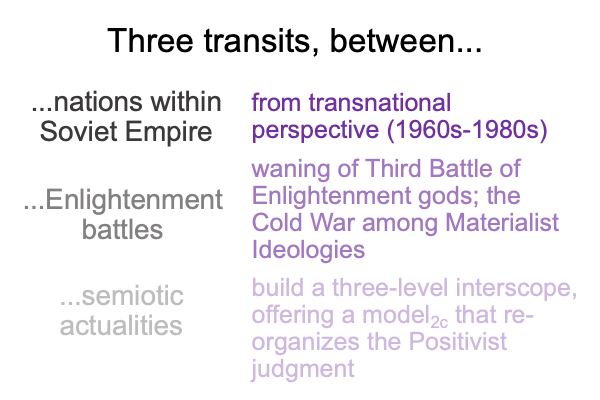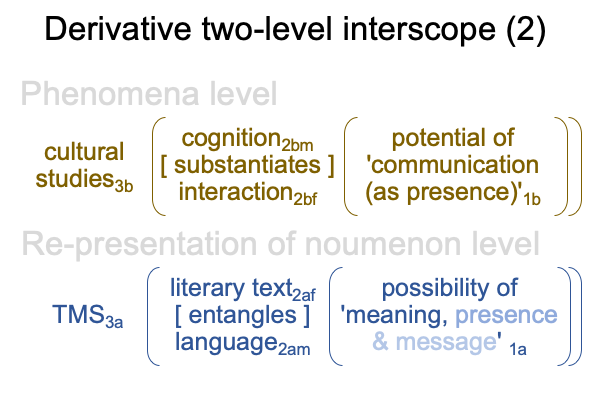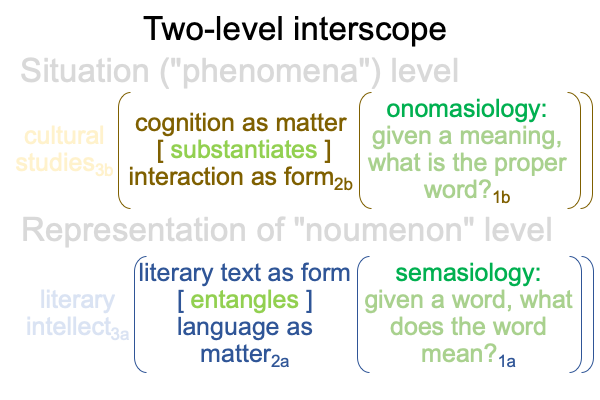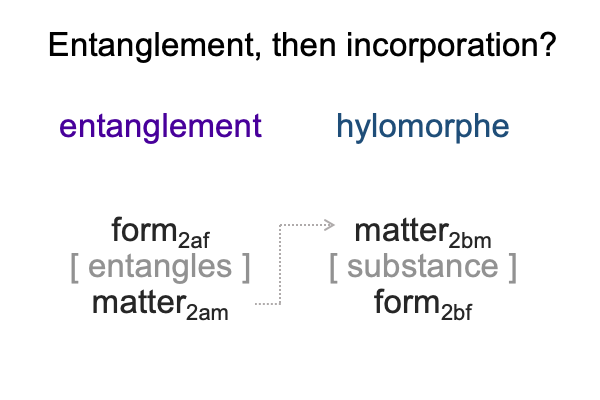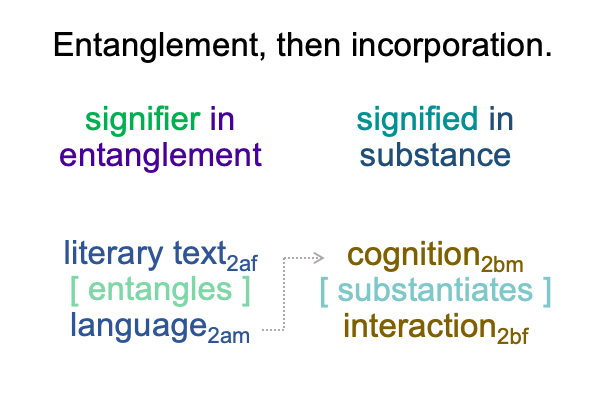Looking at Igor Pilshchikov and Mikhail Trunin’s Article (2016) “The Tartu-Moscow School of Semiotics” (Part 9 of 27)
0110 Now back to Peirce and Aristotle and the confounding at hand.
To start, the empirio-schematic judgment2p is the actuality2p in the nested form produced when the Positivist’s judgment unfolds. The empirio-schematic judgment2p then unfolds into a perspective-level nested form (with subscripts “e”, for now, then “c” for perspective level).
The structuralist model2e serves as an actuality2e, within the unfolded empirio-schematic judgment2e.
Then, the structuralist model2e virtually contextualizes an actuality2(2e), consisting of the dyad, {language as matter [substantiates] a literary text as form}2(2e) (constituting a situation level, the subscript will soon be “2b”).
0111 Do these statements describe the empirio-schematic judgment on the left in the following figure, corresponding to what ought to be (secondness) for the Positivist’s judgment?
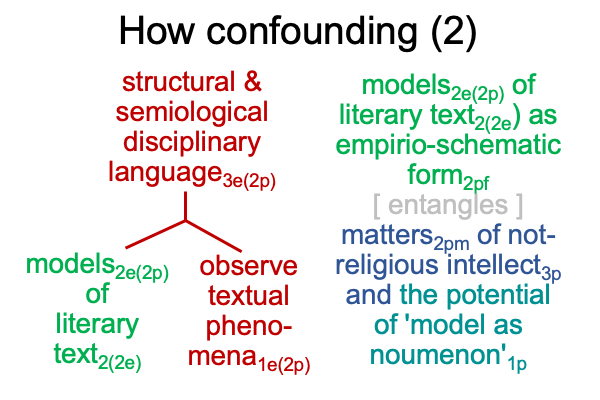
0112 According to the triumphalist scientist, models2 of the literary text as form2e(2p) should occupy the slot for the noumenon1p, the literary text itself. When that happens, then the noumenon-occupying model1p [can be objectified as] its literary phenomena.
That is one aspect to the substitution.
0113 Another aspect is that the perspective-level model2e(2p) contextualizes the situation-level literary text as form2(2e). This situation-level form2bf enters into the noumenon1p, via the model2e(2p), as anticipated by triumphalist scientists, and entangles matters2pm salient to a not-religious intellect3p operating on the potential of the literary text as noumenon1p [and] its corresponding literary phenomena1p.
0114 How confounding is that?
When the model2e(2p) replaces (or overlays) the noumenon1a, it2e(2p) does not entangle literary phenomena1c. Rather, it2e(2p) entangles a language2am of positivist meaning1a.
It makes me wonder, what matters2pm are salient to a not-religious intellect3p operating on the potential of… whatever inspires Kant’s slogan1p.
Kant’s slogan?
A noumenon cannot be fully objectified as its phenomena.
0115 Okay, if Kant’s slogan is relevant, then I wonder, “What does a noumenon have that its phenomena cannot objectify?”
What words apply?
They cannot be scientific terms. They must be um… phenomenological labels.
0116 Well, what does any phenomenologist say that any particular noumenon must be?
To start, a noumenon has a meaning that cannot be reduced to its phenomena.
Then, a noumenon has a presence that cannot be fully objectified as its phenomena.
Also, a noumenon may offer a message that cannot be found in the observable and measurable aspects of the thing itself.
0117 As an exercise, replace the term “noumenon” with “the literary text as form”. Then, ask whether the phenomenological approach is sufficient.
Remember, phenomenology, Russian theory, structuralism and semiology develop in a modernist and science-fixated Zeitgeist during the first half of the twenty-first century.
0118 What does this imply?
If structure or system is the thing where semiology as matter [substantiates] aesthetics as form, and if the structuralist thing pertains to the mother-tongue as matter, and if {the native language as matter [substantiates] a literary text as form}, then an entanglement may occur.
The literary text as form can entangle model-illuminated words as matter, because these words reveal the possibility of aesthetic meaning, presence and message for the literary text as form.
0120 Here is a picture.
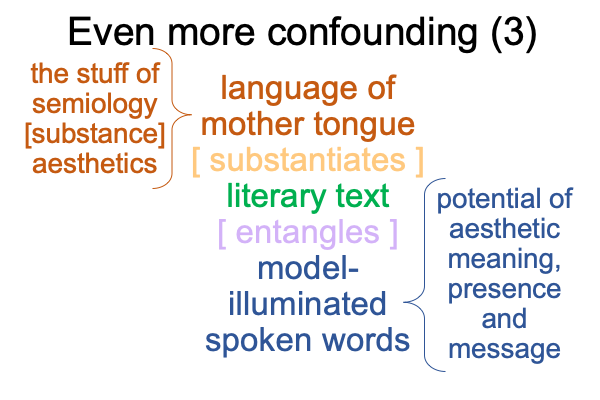
0121 I ask, “What does this derivation have to do with the history of the semiotics of the Tartu-Moscow School of Semiotics?”
My answer is freaky.
The members of the Tartu-Moscow School, in their transnational collaborations, embody the derivation rendered in this examination.
0122 How do I know this?
0123 The collaborators are all interested in making academic inquiry into Slavic languages and literature more scientific, in accordance with the “Socialist” title of the USSR, and in accordance to their own expertise as linguists.
This examiner has a model of the scientific enterprise as a Positivist’s judgment, not available to those who lived in the twentieth century. This model allows me to express their history in terms of later semiotic discoveries in the Peircean tradition.
0124 The examiner does not subtract from the achievements of the Tartu-Moscow School of Semiotics. Rather, the examination shows how cunning these researchers turn out to be. They protect their own field of study from reductionists. They set on finding a path suitable to a not-religious intellect, in accordance with science.
In the process, they unearth concepts that are foundational to Slavic civilization.
They make archaeological discoveries.
0125 The Positivist’s judgment contains two judgments. The Positivist judgment is a triadic relation that contains the empirio-schematic judgment as one of its elements. Without the empirio-schematic judgment, the Positivist’s judgment could not function. So, the empirio-schematic judgment is fundament. The Positivist’s judgement is derivative.
0126 The confounding leads to a separation of the two judgments. The empirio-schematic judgment serves as the perspective-level of a fundament three-level interscope. The Positivist’s judgment serves as the content-level of a derivative three-level interscope.
At the same time, the confounding binds the two interscopes.
0127 Here is a picture.
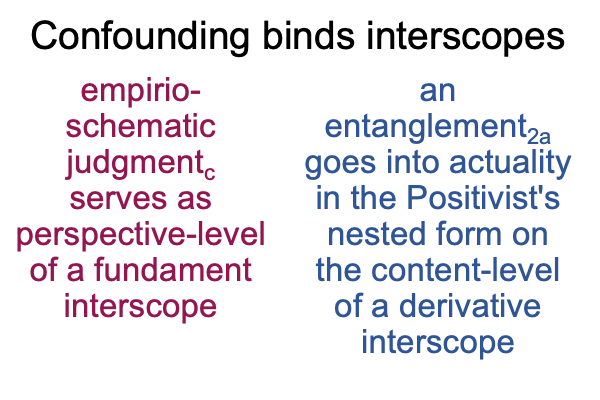
0128 The semiological and structuralist literary thing entangles an aesthetic (yet not-religious) language of meaning, presence and message.
One form, the literary text, stands in dyadic relation to two matters, one substantiating and one entangled.
0129 The next task of this examiner is to derive the fundament and derivative interscopes.

